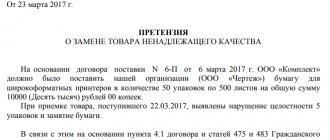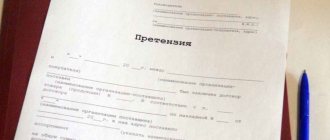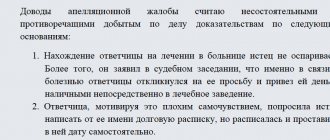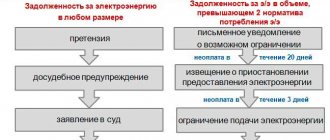Court order to collect debt for housing and communal services: concept and legislative regulation
Writ proceedings are different in that the tenant (tenant), owner of the premises, or tenant often learns about the forced collection of debt from him when the bailiffs begin work. However, the emphasis in the article will be on respecting the interests of providers of utility services.
A court order is understood as a document issued by a judge, on the basis of which the debt accumulated for rent and equivalent payments is forcibly collected from the payer. In fact, the order immediately combines a court decision and a writ of execution form.
Justices of the peace and arbitration courts are authorized to issue (judicial) orders regarding housing and communal services. The choice of court for appeal is mainly determined by the legal status of the debtor.
When this is an ordinary citizen, an application for an order with supporting evidence is submitted to the magistrate.
If you need to collect an overdue utility debt from an individual entrepreneur, a commercial company, or a public organization, you should contact the arbitration court.
He has the right to issue an order for the amount of debt not exceeding 400,000 in rubles. In this case, evidence of the other party’s recognition of its obligations is attached to the application.
Normative base
The housing and communal services sector is regulated by codes, federal legislation, and legal acts that define the conditions and procedure for the provision of certain types of utility services.
The list of regulatory documents mentioned includes the Housing Code (in relation to residential premises), rules, instructions, tariff calculations approved at the government and local levels.
When direct contracts are signed with utility service providers, they are subject to the general rules of the Civil Code of the Russian Federation. The relevant articles of the code concern the form and essential terms of the agreement, the procedure for its amendment, and termination.
The procedures for issuing a court order and its revision are regulated by procedural legislation. In the first place are the Russian Civil Procedure Code and the Agro-Industrial Complex of the Russian Federation.
Since upon completion of writ proceedings a writ of execution is issued, further collection of utility debts is regulated by the provisions of the Federal Law “On Enforcement Proceedings”.
Grounds for canceling a court order
The peculiarity of the order issued by the court is that the debtor is not warned in advance about the collection of the debt from him for the "utility" and the fact of going to court in this regard.
These circumstances become known to him when a court order arrives at his address, suggesting the collection of debt with an indication that if it is not paid, it will be forcibly collected by bailiffs, for example, from a bank account and other means.
Please note! The recipient is given only 10 (ten) days to cancel such a court order, otherwise the writ of execution will be put into effect.
What reasons can be identified when challenging an act?
The first reason is the disagreement of the “debtor” with the amount to be collected from him (along with the accrued penalty).
In this situation, you should calculate the debt yourself, provide these calculations and refer to the relevant payment documents confirming payment of part or all of the debt.
Always collect all your receipts, because this is the only way you can confirm that you have paid a particular amount. Keep complete records of them. It is better if documentation for three years is retained (based on the general statute of limitations).
Only this will be your insurance in case you need to substantiate your position when the conflict moves into litigation.
Another reason why it is possible to prove the dubiousness of the legality of a court order is the collection of a debt outside the statute of limitations for filing claims. The statute of limitations for filing claims also affects payments in the housing and communal services sector.
And the third reason for challenging the order issued by the court to collect unpaid bills for residential complex services is the non-compliance of the document with the standards established by law (a number of requirements are imposed on the document). You can get acquainted with them by reading Article 124 of the Code of Civil Procedure of the Russian Federation.
Reasons for receiving
If we talk about collecting utility debts from citizens, a court order for these obligations is issued on the basis of Art. 122 Code of Civil Procedure of the Russian Federation. One of the reasons for obtaining a simplified decision is arrears in payment for housing, utilities or communication services.
To obtain a court order, it is required that the amount recovered be within half a million rubles. Otherwise, you must file a claim in court, with all the ensuing consequences.
Often the question is, what is the minimum amount of debt (as well as the period of delay) that gives the right to go to court, because the Code of Civil Procedure does not give any instructions in this regard.
Theoretically, one can take as a guideline paragraph 118 of Government Decree No. 354 of May 6, 2011, dedicated to the procedure for the provision of utility services. It states that if there is a debt of at least 2 months, resource consumption may be limited.
Courts issue a court order upon documentary evidence of claims against the debtor. In this case, there should be no dispute over the amounts or period of delay. All calculations must be justified before the court.
The Arbitration Procedure Code of the Russian Federation does not directly state that a court order is issued specifically in relation to “municipal” obligations. We are talking about monetary amounts without specifying their type at all.
However, there are three main conditions:
- Total claims should not exceed 400 thousand rubles.
- The relationship between the debtor and the collector is based on a signed agreement.
- The amount of the debt is not disputed by the obligated party (there must be written confirmation of this).
If one of the above points is problematic to fulfill, the court will refuse to issue a court order. Then there is only one thing left to do - write a claim to the debtor and file a statement of claim.
Where to look?
Expert opinion
Stanislav Evseev
Lawyer. Experience 12 years. Specialization: civil, family, inheritance law.
A court order is understood as a court order that is issued at the request of a management company to collect a debt for housing and communal services. It has the force of a writ of execution.
The law does not set a time limit for when the management company must go to court. A prerequisite for issuing a court order is that the maximum amount of debt is not more than 500,000 rubles.
As a rule, the organization initiates legal proceedings 6 months from the date of debt formation. However, this is not necessary. In practice, it happens that the debt accumulates even for 10 years.
Often, the management company applies to the magistrate's court to obtain a court order.
| No. | Main reasons |
| 1 | Debtors do not often appeal court orders |
| 2 | The process is carried out as quickly as possible (no more than 2 months) and without the presence of the parties |
| 3 | The state duty is 50% of the duty for claims proceedings |
| 4 | The law does not provide for the defendant’s ability to influence the decision |
That is why the defendant often finds out about the extradition after the document is issued. The management company, as a rule, does not notify the debtor about the issuance of a court order.
How can a debtor find out about the issuance of a writ of execution:
- upon delivery of the order;
- from the bailiff.
If you suspect that the management company will be able to initiate a lawsuit, you can independently monitor the information on the FSSP website. As soon as enforcement proceedings are initiated, the information will become publicly available.
The procedure for collecting utility bills in writ proceedings
In procedural terms, the procedure depends on who is the debtor. If the obligations are not fulfilled by an individual, you should first study the norms of the Code of Civil Procedure of the Russian Federation regarding writ proceedings.
When debts for utility bills are registered with a company or individual entrepreneur, similar provisions apply, but taking into account the requirements of the Arbitration Procedure Code of the Russian Federation.
Utility debt is usually claimed in a proceeding called a writ. And if so, then it is not a lawsuit that is filed with the court, but an application for the issuance of a court order to collect the debt for utilities. It is written and addressed to the justice authority according to a special procedure.
Below we will look at the procedure for receiving funds to pay off obligations under the company. payments, two common categories of debtors.
From legal entities and individual entrepreneurs
In order to collect debt from business representatives, it is mandatory to have a direct agreement for each type of utility service. In addition, there must be evidence of recognition of the debt by the other party. These easily include a reconciliation act signed by the parties or an affirmative response to the claim.
Now a few words should be said about choosing the appropriate arbitration court. Usually, the court in the territory where the debtor is located is responsible for issuing the order. However, in the contract, its parties agree on the contractual jurisdiction, for example, at the location of the plaintiff.
To obtain a court order, an application is prepared, to which all documents are attached confirming the debt itself, its amount, taking into account the accrued penalty.
A separate issue concerns the state duty. First, according to the rules of the Tax Code, the payment should be calculated in relation to an ordinary claim in an arbitration court. But for a court order, the required contribution is exactly 2 times less than the amount received.
From individuals
The issuance of writs falls within the competence of magistrates. The coordinates of the required site can be found on the Internet. An application addressed to a magistrate is drawn up according to the same principles that apply to an arbitration court.
The state duty is paid in the same amount. The only difference is that the amount of payment for the claim (base) is calculated according to different rules. The scale is given in paragraph 1 of Article 33.19 of the Tax Code of the Russian Federation.
In both situations described, the claimant is not called to court. If the application has shortcomings or the requirements do not fall within the scope of the writ proceedings, a determination is made to return the application.
If there are no procedural obstacles, the court issues a court order to collect debt on utility bills. Therefore, you should maintain constant contact with the office or secretary.
After the time for the debtor to file objections (appeals) to the court order has expired (10 days), it comes into effect. Next, the claimant receives his own stamped copy from the court and transfers it to the bailiffs for the stage of enforcement proceedings.
Procedure
If you have received an order issued by the court, this is not a reason for despair, since it can be canceled, and there is nothing difficult about it. To perform this action, you do not even need to perform multiple complex actions, preparations, and do not even need time to collect any evidence.
But, at the same time, it should be understood that the “debtor” is given exactly 10 days, no more, to cancel the court document. This period is prescribed by law, and violation of this period will result in failure to accept the objection and subsequent collection of the debt as ordered.
Remember! If the debtor disagrees with the order prepared by the court, he should urgently send a protest to the magistrate’s court in which the decision was made. A separate statement (objection) should be prepared and the reasons for cancellation should be given.
There are several ways to file an objection to a court decision approving an order to collect a debt:
- personal delivery (the applicant takes the objection to the court);
- by postal service (the objection is sent in writing by mail);
- with the help of a legal representative (the task is entrusted to an authorized person).
Note! A court order can only be canceled by the judge who issued it, therefore the objection should be directed to him.
Along with the petition for the court to cancel the document adopted - the court order - it would be better to additionally file an objection to the commencement of enforcement proceedings. This document can stop the work of performers at the very beginning of their actions.
How to make an application
Let us remind you that when it is necessary to collect a debt for consumed utility services, the amount of which is beyond doubt, it is not a lawsuit that is prepared, but an application for a court order.
If the delay occurred from an individual, the documents are considered individually by the magistrate in the territory of residence of the citizen. Similar claims against business representatives are being studied in arbitration court.
An approximate sample application for a court order to collect a debt for utilities can be downloaded on our resource. The proposed structure is equally suitable for civil and arbitration proceedings.
A heading is always written first, indicating the court, the claimant, and the debtor.
After indicating the name of the application, it is advisable to provide the total amount of claims (by analogy with the price of the claim). Then the judge will immediately understand whether writ proceedings can begin.
The main part focuses on the conditions for the emergence of municipal debt. If services are provided on the basis of a direct contract, its details are provided. It is important to provide not only the date of signing, but also the validity period of the agreement.
Information about the debt is written out so that the indisputable nature of the amounts is clear - on a monthly basis.
In particular, it should be mentioned:
- period of existence of the debt;
- principal amount of obligations;
- the amount of the penalty with the legal basis for its accrual.
If the calculations are voluminous, they can be made as one of the attachments to the application to the court, in the form of an Appendix on the calculation of debt for utility bills.
The following documents are attached to the application:
- service agreement;
- other evidence of debt;
- payment order for state duty;
- notification to the debtor of the amount of debt.
If a representative is involved in the execution of the order, a copy of his power of attorney is added to the application.
It is important to correctly formulate the composition of the requirements for which it is necessary to obtain an executive document. Separate paragraphs of the application should indicate the main debt, penalties, procedural costs (state fees).
In arbitration (civil) proceedings, a copy of the application for a court order is not sent to the other party. All prepared and collected documents are submitted to the court in the singular.
How to challenge a decision of the magistrate's court?
The advantage of the magistrate's court decision for the defaulter is that the issued joint venture is easy to challenge. This can be done within 10 days after the notification of the decision is issued.
The basis for the procedure may be the debtor's disagreement regarding the amount accrued to him . Also the reasons are:
- expiration of the statute of limitations;
- the order does not comply with the standards specified in Article 124 of the Code of Civil Procedure of the Russian Federation;
- the fact that the debtor filed an objection is evidence that the utility services' demands are unreasonable. A decision can only be made if they are beyond dispute.
This is important to know: Pay for water supply and heating using a personal account
What to do if you receive an objection to a court order
Any debtor (including for utility services received) has the right to appeal a court order. There are certain time limits for this. Regardless of the type of legal proceedings, 10 days are allotted for filing an application to cancel the order from the date the other party receives a copy of the court decision.
The claimant may not know about the existence of an appeal or objection to the court order, since the debtor is not required to send a copy of it to the other party. It is therefore advisable to obtain information directly from the court from time to time.
Objections to a writ are always filed with the court from which the document originated. The debtor does not pay any state duty for this.
In accordance with procedural rules, an application to cancel a court order is considered by the court without summoning the parties. The very existence of an objection to an order is already grounds for its cancellation.
If the court order loses force, it is too early to put an end to the dispute (after all, the problem with the debt has not yet been resolved). In this case, a standard justified claim is filed for overdue debt in compliance with the principles of jurisdiction and an adjustment to the limitation period.
Before filing a claim (if it is submitted to arbitration), you must remember to submit the claim. Without it, debt collection proceedings will not be started.
If the claim was sent before the application for the order was submitted, it does not need to be sent again, provided that the requirements are not increased. After all, the new amount may differ from the figures present in the application for a court order (debt for utilities has increased, penalties).
It is important to remember that if the court order is cancelled, the state fee for the statement of claim is not paid again, but is paid additionally taking into account the size of the final amounts. Accordingly, a copy of the first payment order is attached to the claim.
How to challenge a court order for utility payments: the deadline has passed
To challenge the order within the framework of summary proceedings, the debtor is given 10 days, starting from the date of receipt of the notice of collection. If there are compelling reasons, the court may decide that such a period can be extended and set aside the order.
If the proceedings have begun, then the debtor must submit a photocopy of the court decision to the Federal Bailiff Service. Such actions are necessary, since the period for notifying the bailiffs about the fact of canceling the order is unknown. If the order remains in effect, then according to the criterion of legal force it will be equivalent to a writ of execution. The debt collection procedure in this case will be carried out within the framework of current rules.
The debtor may face:
- retention of funds;
- seizure of property;
- selling things through auctions;
- restriction of travel outside the country.
If an error was made, the “debtor” has the right to insist on the correctness of the calculation and may subsequently go to court to protect his own interests. In this case, you will need to collect the required package of papers and prepare to participate in court proceedings.
Today, utility service providers have several levers of influence over debtors, which include the ability to use simplified debt collection procedures. To do this, certain conditions must be met and an application must be filed with the court. A citizen has the right to request the annulment of the order if there are sufficient grounds, and after the allotted period has passed, the procedure for canceling the decision is possible by filing a claim and going through the standard procedure.
Recommendations for collecting debt for utilities
At first glance, it seems that filing documents with the court to formalize a decision in the form of an order is much simpler than dealing with a standard lawsuit. There is no need to prepare copies for the other party or ensure their mailing. And legal costs are significantly lower. State fees and legal costs are saved.
At the same time, mistakes when writing an application for a court order only lead to unnecessary loss of time. The following recommendations will help you avoid the described inconveniences.
Tip 1. Checking the debtor's registered address
Difficulties can lurk in the most unexpected moments. For example, a citizen could change his registration address. Then correspondence from the court lies in the mail for a very long time, and, accordingly, debt collection is postponed indefinitely.
Therefore, it is useful to bring up the latest payment receipts and recent correspondence with the debtor. There you may find an additional current residential address. Then the statement can indicate several coordinates of the second party.
Tip 2. Accurate debt calculation
When forming for the collection of the principal amount, penalties, errors and discrepancies are not allowed. Otherwise, the court may doubt the credibility of the claims. As a result, the dispute will move to the stage of hearing the claim.
Before going to court, it is advisable to address the debtor with a claim, an act of reconciliation of bilateral settlements. This procedure is intended to convince the judge of the indisputability of existing requirements.
Tip 3. Correct formatting of postal correspondence
It is possible that the debtor’s registration is legally located in another city. Then the application to the court with documents must be sent by mail. There are also some rules here.
For example, an inventory of the attachment is required, which lists the materials attached to the application with the number of sheets. A return notification of receipt of the shipment by the court would not hurt.
New procedure for collecting debts for housing and communal services
On December 29, 2020, the Plenum of the Supreme Court made clarifications regarding the collection of debts for housing and communal services.
Several advantages:
- simplicity of the procedure. Utility services only need to go to court;
- the inevitability of collection. The order is an executive document. On its basis, funds that have not been paid can be written off from bank cards and accounts.
Conditions for applying to a magistrate's court:
- the debt arose in more than three months.
Now utility companies can use the following procedure when dealing with non-payers:

- after three months of no payments, the person is sent a notification that he has a debt. The notice can include a clause stating that if the amount is not repaid within the specified time frame, measures will be taken against the person in the form of suspension or disconnection of utility services.
- If the person does not heed the arguments of the notification, a claim is sent to the magistrate's court with documents confirming the circumstances of the case attached.
- The judicial authority makes a decision based on the documents provided. The parties to the case are not called to the hearing.
- The decision will be made after 5 days.
- A court order is issued.
The simplified procedure allows utilities to receive unpaid funds and also avoid lengthy litigation.
Lawyer for collection of utility bills in Yekaterinburg
Be sure to take into account the information we provide. It will be useful to you. And our housing lawyer will always answer additional problems that arise in your life.
Just call and we will start solving the problem together - professionally and on time.
USEFUL: watch the VIDEO with practical advice from lawyers to management companies on ways to collect utility debts efficiently and on time.
Panacea or not
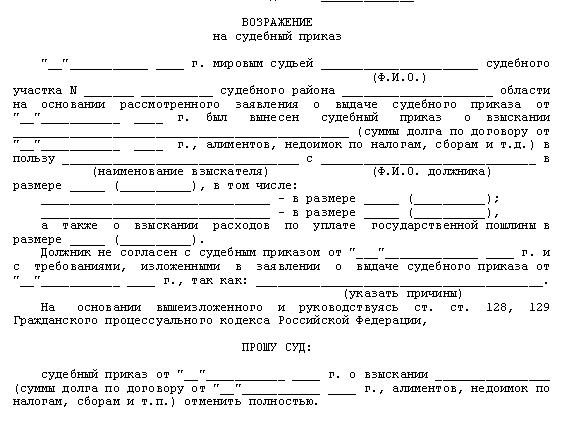
Accordingly, all orders and decisions can be appealed by citizens and organizations. It should be noted that the samples of objections to a court order for almost any reason are similar to each other. And they mainly come down to the fact that the person does not agree with the collection of funds.
Is this a panacea? Not at all. But in some cases, a court order can actually be canceled. Therefore, it cannot be said that the act being studied is a 100% victory. But they should not be neglected.
What documents must be attached to the application?
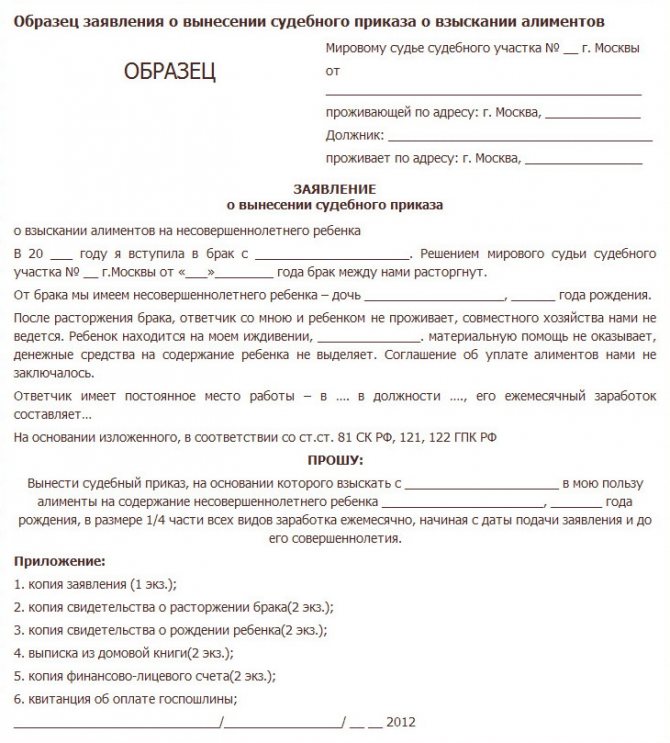
Sample list of papers:
- a copy of your statement regarding execution;
- a copy of the enforcement order received by mail;
- a copy of the mail envelope indicating the date of receipt of the order;
- documents certifying the essence of your arguments.
State fee for filing an objection to a court order
Objections to a court decision are not burdened with tax requirements. You will not need to pay a state fee. How to find where to download her form.
Deadline for filing an objection to a court order
The protest must be filed within ten days from receiving a copy of the decision. Often, the claimant resorts to writ proceedings, hoping that the debtor does not have enough time to do anything in such a short period of time. And the court will not cancel the decision.
There is one important nuance that is difficult for a person without legal education to understand: what moment is considered the day of receiving a certified copy of the executive act? The day of receipt is the date when the postman brought you the envelope. Often the post office only notifies you that registered mail has arrived in your name, asking you to choose a time and pick it up yourself.
From the moment the letter arrives in the mail, it is stored for exactly seven days. Its receipt becomes extremely important, otherwise the letter will be returned to the judicial authority and, after a week, the ten-day period provided for appeal will begin to run. Failure by the debtor to receive the letter without good reason will deprive him of the right to appeal the enforcement order on collection. The judge may decide to reinstate the term if there are good reasons.
Send us a message Cancel reply
for any questions
- 96% successful cases
- Professional lawyers
- Absolutely free
Document submission deadlines
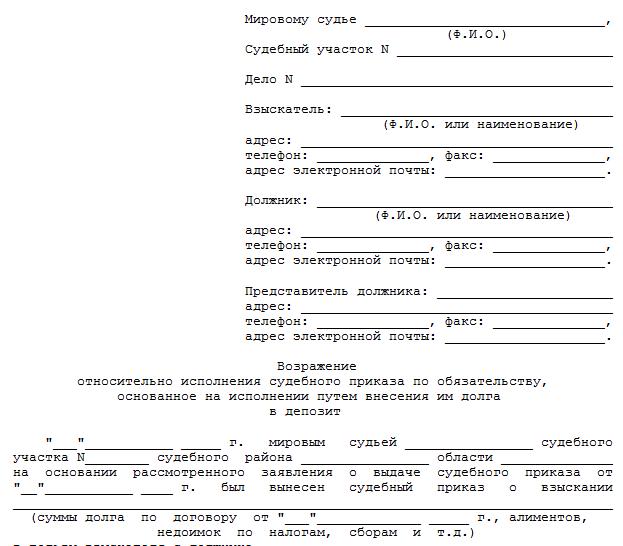
Filing an objection to a court order for any reason has certain rules and algorithms. Citizens do not have much time to appeal an earlier decision. If you miss the deadline, it will be impossible to return it.
The point is that citizens and organizations have the right to review a case within 10 days from the date of a particular decision. This is the period given to people to draw up and submit objections.
If you fail to meet the allotted time, you can completely forget about revising the order. According to the law in Russia, it is not possible to return the lost period.
It should also be noted that the 10-day countdown begins when the recipient receives the order. Therefore, in practice, an appeal usually takes longer than 10 days from the date of a particular decision.

